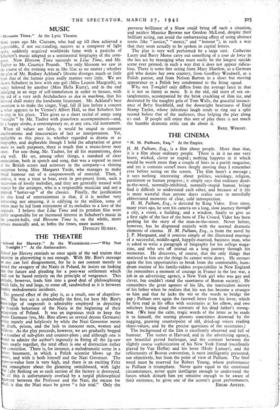THE CINEMA
" H. M. Pulham, Esq." At the Empire.
H. M. Pulham, Esq., is a film about people. More than that, it is a film about ordinary people. There is in it no one very brave, wicked, clever or stupid ; nothing happens in it which would be worth more than a couple of lines in a parish magazine, and yet it contains scenes more deeply moving than I remember ever before seeing on the screen. The film hasn't a message ; it says nothing interesting about politics, sociology, religion, patriotism or human progress ; it simply says that ordinary dyed- in-the-wool, normally-inhibited, normally-stupid human beings find it difficult to understand each other, and because of it life is more wasteful than anyone dares realise save in mercifully abbreviated moments of clear, cold introspection.
H. M. Pulharn, Esq., is directed by King Vidor. Ever since, many years ago, he sent his camera on a long, slow journey through a city, a street, a building, and a window, finally to give us a first sight of the face of the hero of The Crowd, Vidor has been probing for the story of the man-in-the-street. Never before, however, has he dispensed entirely with the normal dramatic elements of cinema. H. M. Pulham, Esq., is from the novel by J. P. Marquand, and it consists simply of the illustrated musings of a successful, middle-aged, happily-married, business man, who is asked to write a paragraph of biography for his college maga- zine, and who sets off instead on a long journey through his memories. He discovers, of course, that the only things that mattered to him are the things he cannot write down. He savours again the lost opportunities to break from the comfortable, hum- drum routine of his family-ridden respectability in New England (he remembers a moment of courage in France in the last war, a job in an advertising agency, a New York girl who was gay and clever, but couldn't stand the snootiness of Boston society). He remembers the great agonies of his life, the inarticulate misery of his father when he realises that his son has become a stranger to him and that he lacks the wit or the words to bridge the gap ; Fulham sees again the farewell letter from his lover, which he first read in His office with secretaries at his elbow, and two solicitors listing aloud the contents of his dead father's strong- box. (We hear the calm, tragic words of the letter as he reads it to himself, the searing phrases sometimes drowned by the nagging, gnawing counterpoint of old, dried-up voices reading share-values, and by the precise questions of the secretaries.)
The background of the film is excellently observed and full of humour. The scenes at Harvard, and in the advertising agency, are beautiful period burlesque, and the contrast between the slightly coarse sophistication of his New York friend (excellently played by Van Heflin) and his lover (Hedy Lamarr), and the refinements of Boston convention, is most intelligently presented, not objectively, but from the point of view of Pulham. The final word must be reserved for Robert Young, whose performance as Pulham is triumphant. Never quite equal to the emotional circumstances, never quite intelligent enough to understand the forces which disturb him yet sensitive enough to be aware of their existence, he gives one of the screen's great performances.
EDGAR ANSTEY.


























 Previous page
Previous page